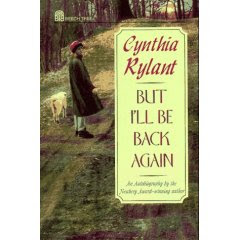 Having read this a couple weeks ago, I was won over to Cynthia Rylant's side with her childhood album. At first I thought, "wow, she is pretty open about some things that have happened to her," and then I realized she has to be - she's a writer and that's what writer's do. After having read this, I can see that her books and stories are not just creations, but her way of "seeing" the world she only "felt" as a child. Rylant did not touch on her adult life at all unless relating it to her childhood. The fact that she had a child and two marriages was all she needed to say. Everything else is a function of her childhood.
Having read this a couple weeks ago, I was won over to Cynthia Rylant's side with her childhood album. At first I thought, "wow, she is pretty open about some things that have happened to her," and then I realized she has to be - she's a writer and that's what writer's do. After having read this, I can see that her books and stories are not just creations, but her way of "seeing" the world she only "felt" as a child. Rylant did not touch on her adult life at all unless relating it to her childhood. The fact that she had a child and two marriages was all she needed to say. Everything else is a function of her childhood.It was very interesting the way she wove and integrated the lyrics by Lennon and McCartney. It's amazing what an impact music can have on your life. I can't think of a childhood obsession similar to this that I may have had, beyond Disney musicals which consumed my childhood. However, I am familiar with the power of lyrics. As for childhood lyrics, mine were not political figures holding press conferences, they were my grandparents and maybe Captain Kangaroo or JEM or Captain Planet (bringing pollution down to zero). Cartoons were/are a big deal.
I was moved by Rylant's connection to her father, discovered after he had passed. For her to find out that her chosen profession is something her estranged father excelled in must have filled her heard and given her a sense of pride. I was happy to see a photograph of her father in the back of the book. In fact, I was happy to see all of the photographs included at the end of her album. Each one is so appropriate in its own way, ending with her. The letter, though, really drew me to Rylant and her father. I can only imagine how difficult it must have been for him to be separated from his daughter all that time.
Reading about Rylant's life from her voice and not the voice of a character likens me more toward her. As unhappy as her childhood may or may not have been, I'm glad she grew up to find stories and words inside of her so that she could finally see her world.




